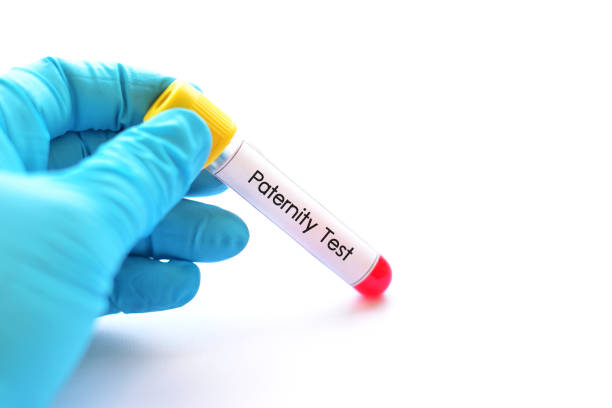The issue of getting a DNA test has been a dicey conversation for many years.
In an ideal world, all children would know their parents’ identities, but this is unfortunately not often the case.
Abiodun Salami, a senior geneticist at the DNA Centre for Paternity Test on Allen Avenue in Ikeja, Lagos, states that approximately six out of ten children undergoing DNA testing believe the wrong person is their father.
However, an exact percentage is impossible to determine.
Paternity tests are a reliable and cost-effective way to learn the truth.
Delaying the truth can severely affect a child.
Building a rapport with a man who isn’t their father causes significant suffering for both parties.
When a baby’s real father is unclear, a paternity test at birth can clear up ambiguities.
This ensures the father-child bond starts well.
However, we recognize that paternity is a very personal and sensitive subject that can have a tremendous influence on families.
Before taking a paternity test, think about your own situation and how the results of the test can affect family connections.
In some circumstances, seeking counselling to help both parties deal with the aftermath of the results may be a smart option.
What is a Peace of Mind Paternity Test?
Peace of mind paternity tests provide personal knowledge only.
The test kit is shipped to your chosen address, allowing you to collect swab samples at your convenience.
You can then send them back to our laboratory for the necessary testing, and we will provide you with a report that will prove paternity.
Despite its accuracy, this test cannot be used legally because an impartial party didn’t obtain the sample.
Read: How Does Oral Health Affect Overall Wellness?

How Old Does a Baby Have to Be for a DNA Test?
How soon after birth can a newborn get DNA tested?
This is a question that many people have posed over the years about doing a paternity test after a mother has recently given birth.
The most crucial thing to remember about baby paternity tests is there is no legal set age across the country.
If the hospital declares your child healthy, you can do a paternity test on the same day.
If you want to do a paternity test on a newborn or a very young child, there is one thing to keep in mind.
Parents must think about how they want their samples gathered.
A buccal swab DNA sample collection or a blood DNA sample collection are the two options.
The main distinction between the two is straightforward.
The buccal swab sample collection is not painful, but the blood sample collection is.
Additionally, the devices used to get DNA samples are also a clear distinction between the testing choices.
Read: Navigating Food Allergies and Intolerances
How does a DNA test work on a baby that has recently been born?
Whether the kid in question is a newborn or an adult, all of our peace of mind paternity tests are conducted in the same manner.
Paternity testing compares the DNA profile of a child with that of the purported father(s).
The test examines up to 42 DNA markers in order to determine whether half of the baby’s DNA comes from the claimed father.
Because each individual receives half of their DNA from each of their biological parents, such a comparison can aid in determining paternity.
When testing the biological father of the child, both portions of DNA will be identical at each marker.
This will not be the case if the male tested is not the biological father.
Read: How to Bounce Back From Pregnancy and Postpartum Depression

What is the Process for Paternity Testing?
Paternity testing is a touchy subject.
Put Your Tech Company on the Map!
Get featured on Nicholas Idoko’s Blog for just $50. Showcase your business, boost credibility, and reach a growing audience eager for tech solutions.
Publish NowAll participants must be physically present at the moment of sample collection.
For the tests to take place, both people must give a written agreement.
Each participant signs the paternal test samples before the authorised phlebotomist who collected the samples seals them for security reasons.
Consent of parties
To continue with a paternity test, both the male and the woman must sign a written consent form.
When you come to the laboratory for the sample collection, you will be given consent forms.
Required documentation
When the child is under the age of legal consent, the mother must accompany the child for identification and offer signed consent (18 years).
Only by testing the father, mother, and child together can the biological paternity of the child be established.
If the test is solely for the purpose of exclusion, the father and kid can be tested separately.
Valid identification of both parents is required. The following will be accepted:
- International passport
- Driver’s license
- National ID card
We require the following documents for the child/children:
- Birth certificate of each child
- Two passport photos per child
Additional legal evidence proving the requestor’s legal guardian status is required in circumstances when a parent is no longer alive at the time of DNA testing.
Alternatively, the seeking party’s marriage and death certificates will suffice.
Sample collection and testing
The typical procedure involves using an oral swab to gather DNA samples from both the father and the child or children’s inside cheeks.
The DNA is taken from the cells, amplified, and examined using a baseline of genetic markers after the sample is received in the laboratory.
Then, the probability of a biological association is calculated using the results of the data analysis.
Hair, tissue, or blood can be used to obtain special samples if a mouth swab is not available.
Delivery of results
A paternity test result might be a delicate scenario.
The results are kept under strict confidence.
Only the test’s direct participants are informed of the results in person.
Most labs do not communicate paternity test results over the phone, by email, or in any other electronic media.
Within two weeks of collecting the sample, the results are usually ready.
When a court has ordered a test, the results are carefully wrapped and delivered by courier directly to the judge overseeing the case.
Read: How Does Oral Health Affect Overall Wellness?
Final thoughts
Although it may be awkward for a couple to request a DNA test, it is better, in the long run, to determine whether the possible father is the biological father.
It’s no good to procrastinate and then have to break up with a child’s father once a link has been established.
Also, the child has a right to know their medical history and be eligible for benefits from their biological father, and the only way to know for sure (and legally) is through DNA testing.
So, the answer to the question, “Should a DNA test on your child after birth be mandatory?” is yes.
It’s never easy to request the test, but everyone’s hearts should find out the truth without a long, drawn-out drama.
Before You Go…
Hey, thank you for reading this blog post to the end. I hope it was helpful. Let me tell you a little bit about Nicholas Idoko Technologies.
We help businesses and companies build an online presence by developing web, mobile, desktop, and blockchain applications.
We also help aspiring software developers and programmers learn the skills they need to have a successful career.
Take your first step to becoming a programming expert by joining our Learn To Code academy today!
Be sure to contact us if you need more information or have any questions! We are readily available.
[E-Books for Sale]
1,500 AI Applications for Next-Level Growth: Unleash the Potential for Wealth and Innovation
Put Your Tech Company on the Map!
Get featured on Nicholas Idoko’s Blog for just $50. Showcase your business, boost credibility, and reach a growing audience eager for tech solutions.
Publish Now$5.38 • 1,500 AI Applications • 228 pages
Are you ready to tap into the power of Artificial Intelligence without the tech jargon and endless guesswork? This definitive e-book unlocks 1,500 real-world AI strategies that can help you.
See All 1,500 AI Applications of this E-Book
750 Lucrative Business Ideas: Your Ultimate Guide to Thriving in the U.S. Market
$49 • 750 Business Ideas • 109 pages
Unlock 750 profitable business ideas to transform your future. Discover the ultimate guide for aspiring entrepreneurs today!
See All 750 Business Ideas of this E-Book
500 Cutting-Edge Tech Startup Ideas for 2024 & 2025: Innovate, Create, Dominate
$19.99 • 500 Tech Startup Ideas • 62 pages
You will get inspired with 500 innovative tech startup ideas for 2024 and 2025, complete with concise descriptions to help you kickstart your entrepreneurial journey in AI, Blockchain, IoT, Fintech, and AR/VR.
We Design & Develop Websites, Android & iOS Apps
Looking to transform your digital presence? We specialize in creating stunning websites and powerful mobile apps for Android and iOS. Let us bring your vision to life with innovative, tailored solutions!
Get Started Today



